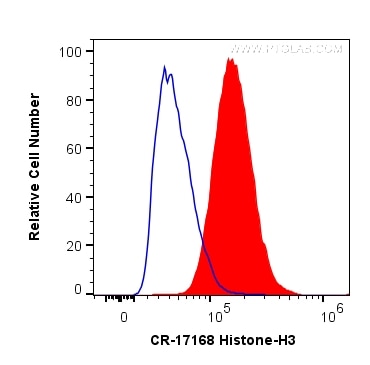Anticorps Polyclonal de lapin anti-Histone-H3
Histone-H3 Polyclonal Antibody for FC (Intra)
Hôte / Isotype
Lapin / IgG
Réactivité testée
Humain, rat, souris
Applications
FC (Intra)
Conjugaison
Cardinal Red™ Fluorescent Dye
N° de cat : CR-17168
Synonymes
Galerie de données de validation
Applications testées
| Résultats positifs en cytométrie | cellules HeLa |
Dilution recommandée
| Application | Dilution |
|---|---|
| Flow Cytometry (FC) | FC : 0.20 ug per 10^6 cells in a 100 µl suspension |
| It is recommended that this reagent should be titrated in each testing system to obtain optimal results. | |
| Sample-dependent, check data in validation data gallery | |
Informations sur le produit
CR-17168 cible Histone-H3 dans les applications de FC (Intra) et montre une réactivité avec des échantillons Humain, rat, souris
| Réactivité | Humain, rat, souris |
| Hôte / Isotype | Lapin / IgG |
| Clonalité | Polyclonal |
| Type | Anticorps |
| Immunogène | Histone-H3 Protéine recombinante Ag10644 |
| Nom complet | histone cluster 2, H3a |
| Masse moléculaire calculée | 136 aa, 15 kDa |
| Poids moléculaire observé | 15-17 kDa |
| Numéro d’acquisition GenBank | BC015544 |
| Symbole du gène | HIST2H3A |
| Identification du gène (NCBI) | 333932 |
| Conjugaison | Cardinal Red™ Fluorescent Dye |
| Excitation/Emission maxima wavelengths | 592 nm / 611 nm |
| Forme | Liquide |
| Méthode de purification | Purification par affinité contre l'antigène |
| Tampon de stockage | PBS avec glycérol à 50 %, Proclin300 à 0,05 % et BSA à 0,5 %, pH 7,3. |
| Conditions de stockage | Stocker à -20 °C. Éviter toute exposition à la lumière. Stable pendant un an après l'expédition. L'aliquotage n'est pas nécessaire pour le stockage à -20oC Les 20ul contiennent 0,1% de BSA. |
Informations générales
Histone-H3, histone cluster 2, H3a is the core component of nucleosome. Nucleosomes wrap and compact DNA into chromatin, limiting DNA accessibility to the cellular machinery which requires DNA as a template. Histones thereby play a central role in transcription regulation, DNA repair, DNA replication and chromosomal stability. DNA accessibility is regulated via a complex set of post-translational modifications of histones, also called histone code, and nucleosome remodeling. Histone-H3 is expressed during S phase; then expression strongly decreases as cell division slows down during the process of differentiation.
Protocole
| Product Specific Protocols | |
|---|---|
| FC protocol for Cardinal Red™ Histone-H3 antibody CR-17168 | Download protocol |
| Standard Protocols | |
|---|---|
| Click here to view our Standard Protocols |


